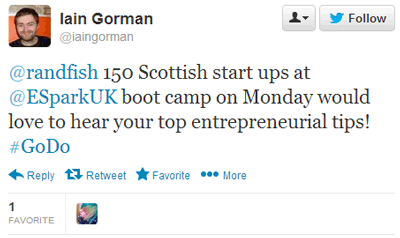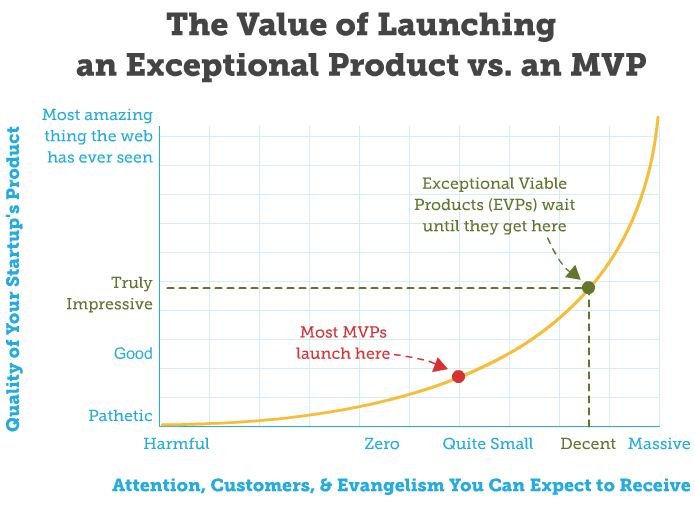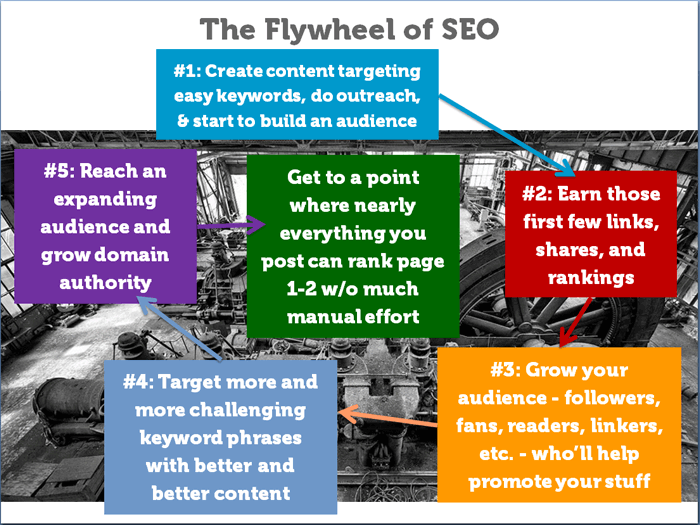If you’ve been reading this blog much, you know I’m something of a contrarian. One of Moz’s core values is, in fact, to be the exception to the rule, and a big part of that comes from my personal ethos of going against the grain. I love the startup world, but I really love the weird, atypical, non-Valley, non-20-something-Ivy-Leaguers-trying-to-be-Zuckerburg startups. So when I saw this tweet from Iain Gorman about an ESparkUK event, I couldn’t help but put together a post.

It doesn’t hurt that I’m a sucker for Scotland. A few years back, I spoke at an event in Glasgow organized by Brian Mathers and the Scottish government. Geraldine wrote some terrific blog posts about our visit. I felt a lot of kinship with the entrepreneurial and marketing communities there – like Seattle vs. the Bay Area, Scotland regularly takes a backseat to the greater London area in media and perception.
So how can I help aspiring Scottish entrepreneurs (and those from everywhere else, too)? Probably not by giving the same advice you’ll see and hear everywhere else in the startup echo chamber. Thus, I’m going to give some of the more unlikely tips I’ve picked up along the way.
#1: Marketing First; Product Second
This goes against every piece of wisdom you’ll find in the startup world, but I’ve seen it work and lived the experience at Moz.
If you build a great product and find that the market you thought would love it isn’t biting, you’re up a creek. You’ve invested valuable time, emotional energy, and likely financial resources to build something that isn’t getting traction, and even if you’re following lean startup principles, the real market often behaves very differently than your early adopter test customers.
But, if you build a marketing machine first, you are in an enviable position. Even if your early products don’t take off, you have a captive audience that’s returning again and again because you’re producing something of value (usually content, thought leadership, educational resources, unique data, or free tools). You can literally create wireframes or a slide deck-based product and see how your audience reacts.
Moz was built on the back of a blog. For the first 18 months of our “product,” we had very little except a few tools (many of which were available in free versions elsewhere on the web) and some guides I wrote. But, because we had a large audience – 10,000 marketers a day read the blog when we started our subscription in 2007 – we could iterate, grow, and learn with their help. By late 2008, we had a unique product that was pulling in subscribers far beyond just our community of blog readers. Without that “marketing first” approach, I’m skeptical if we ever could have gotten a product off the ground.
#2: Lean Development is Good, But MVPs Kinda Suck
The process of building something small and minimal, then iterating on it is a really good one. We’ve actually gotten away from that at Moz over the last couple years and are trying to reign it back in. But, there’s a big caveat.
MVPs kinda suck.

The problem with Minimum Viable Products is that they are very rarely worthy of dramatic praise, very rarely produce exceptional value, and very rarely earn the attention of the influencers & amplifiers (or at least the early adopters) critical to getting traction. And yet, that’s exactly what a startup needs. You want people to get religious about their love for what you’ve built – so much so that they devote real time to evangelizing your company. You want an EVP – an Exceptional, Viable Product.
MVPs almost never do that.
My recommendation is to make your MVPs in-house, dogfood them with your teams and a few select customers, but don’t release them. Wait until those first users (internal & external) are saying “whoa, this thing is pretty amazing.” Then release. The extra time may feel frustrating, but if 30-90 days (or more if you can afford it) of extra effort produces a product that gets over the hump of extraordinary, it’s worth it.
Too many startups build mediocre products because they’re trying to stay lean and deliver MVPs. Don’t deliver mediocrity – put in the time and effort required to be remarkable.
#3: Attitude Often Trumps Aptitude
I’ve seen a shocking number of startups fail despite team pedigrees that would make an investor salivate. Harvard, Stanford, Wharton, Paypal, Facebook, Google, Apple, blah, blah, blah. Give me a team of people who share the same values, beliefs, and mission and who care far more about those than they do about who funds them and how they’re going to get acquired for enough money to buy a house in Silicon Valley.
I like the outliers – the dropout from state schools who feels excited and privileged to work somewhere they don’t have to feel insecure, the woman who barely knew how to code a year ago but is teaching herself by doing, the work-from-home-in-their-spare-hours designer who just got featured on Dribbble for the first time and loves the process – those who are overlooked by others have been some of Moz’s finest hires, especially in the early days.
Don’t be stymied because you can’t find a resume that fits the startup world’s preconceived notions of “quality.” Meet and interview people whose passion for their craft and excitement about your project intersect with shared values & opinions on how a company should be built.
#4: Start with a Business Model that Has Lots of Margin for Error
I make a lot of mistakes – dumb ones, too. But because we’ve got a business that doesn’t depend on one single partnership, doesn’t rely on a tiny handful of customers to pay the majority of the bills, and doesn’t have a single source of traffic that sends 25% of referring visits, we can afford to make a few dumb mistakes.
If at all possible, design your startup to do the same. Those first few years are really hard, and you’re going to mess up. Having alternatives and creating diversity in customer acquisition, in revenue, and in how you get things done (team, partners, data, etc) can be essential to survival when the going gets tough.
As an example at Moz – we didn’t shut down consulting services fully until the end of 2009, when it was clear that our software subscription model had a powerful opportunity to scale. In 2008, we actually ramped UP our consulting out of fear that the financial crisis would dampen subscription revenue. Thankfully, it didn’t, but that release valve made for a lot fewer sleepless nights.
Chris Dixon recently posted about The Idea Maze where he takes a contrarian view on another startup myth (that ideas don’t matter and it’s all in the execution). The two concepts (of seeing the maze and building in margin for error) are highly compatible:
A good founder is capable of anticipating which turns lead to treasure and which lead to certain death. A bad founder is just running to the entrance of (say) the “movies/music/filesharing/P2P” maze or the “photosharing” maze without any sense for the history of the industry, the players in the maze, the casualties of the past, and the technologies that are likely to move walls and change assumptions.
#5: Find Customer Acquisition Channels that Build a Flywheel
Some marketing channels require the same amount of effort or financial investment each time in order to earn traffic & customers. Others, particularly those that fit into the inbound marketing world, generate a flywheel effect. Here’s an example of that happening with SEO:

Those first few links and first few rankings are incredibly hard to earn, but it gets easier over time. Eventually, if you get good at it, you reach a point where the investment per keyword ranking and per visit has diminished massively. SEO works this way, but so do blogging, social media marketing, events & conferences, most forms of content marketing, and even PPC in certain ways/scenarios.
This is what you want to aim for with the majority of your marketing efforts, and particularly early on, when you have a distinctive product in a relatively untapped market (or a disruptive product/focus in an existing one). Those investments will pay off massively over time, and enable you to build a business without the need for huge marketing/sales budgets or teams (which can mean the difference between survival vs. death for a startup who may be challenged to raise funding).
If you want more on this concept, I filmed a Whiteboard Friday video on Flywheel Marketing just a few weeks ago.
#6: Don’t Obsess About Getting a Technical Co-Founder
There are other options. Here’s four – and I’ve seen all of these models work:
- Most obviously, you can learn the skills you need to develop early-stage software yourself.
- Using contract labor isn’t ideal, but if you pick up enough skills to maintain and make slight tweaks/upgrades yourself, it can be a reasonable substitute.
- Choose a way to attack the market/problem that isn’t wholly engineering/development-centric.
- Learn enough to be able to judge technical decisions, and lean on mentors/advisors, but hire technical folks rather than forcing yourself to get a co-founder or nothing. The co-founder bar is a high one, and sometimes you can get good talent without
There’s nothing wrong with finding a great technical co-founder, but there’s a lot wrong with finding a mediocre one, or one who doesn’t work out long-term and creates a messy situation for the fledgling business. One bit of advice that everyone gives that I agree with is that choosing a co-founder must be like choosing a marriage partner – and its breakdown can often spell the end of the company.
#7: Use Outsider Geography to Your Advantage
Rather than re-hash the subject, I’ll point to some posts on the topic of being outside the Bay Area:
- Johnny Miller’s remarkable breakdown of Maptia’s move to Morocco and the advantages that came with it
- Why I’m thankful Moz didn’t move to the Bay Area – my post about keeping our startup in Seattle, despite the pressure to move
- Brad Feld’s talk at Thinc Iowa on building a startup community anywhere
- Cost comparisons of starting a company around the world from Founders & Funders
Let’s say you’re in Glasgow, Scotland trying to start a technology-driven business. Many would view this as a competitive disadvantage, but I don’t. In fact, I think there’s a tremendous number of wins to be had from the outsider status:
- Your costs – all of them – will be lower.
- If you have any degree of success, you’ll automatically be a big fish in a small pond, which will give you an amazing emotional boost and make an entire community invested in your success.
- There is no echo chamber in Glasgow. If you’re building a product that people want, you’ll know, and if you’re chasing unicorns, you’ll know that, too.
- Your accent – no, seriously – have you ever been in a bar in the US with a Scottish accent? People will fall over themselves to talk to you. If you do videos, speak at conferences, record screencasts, or visit with potential investors/partners/etc you’ll be shocked at how you stand out from the crowd and attract an audience.
- If you gain traction, your business will become an excuse for investors/startup folks/speakers/partners to visit Scotland.
- You’ll have a much easier opportunity to attract the best and brightest in your region rather than having to constantly compete with hundreds of other companies, big and small, for talent.
Don’t dismiss the power of being far away from California. Silicon Valley is a state of mind, not a physical place.
—————–
If you have startup advice of your own that goes against the common wisdom, I’d love to read it.
p.s. If you’re curious, there’s a list of interesting tech startups in Glasgow/Scotland here. As you can see, it needs more great companies on it.
